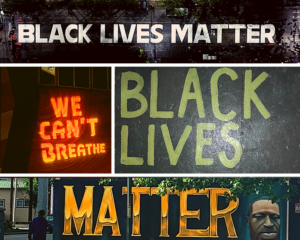As nationwide protests have unfolded over the murder of George Floyd, Brianna Taylor, and many more Black, Indigenous, People of Color (BIPOC), the staff at A Way Home Washington have been reflecting on the intersection between the over policing of BIPOC and youth and young adult (YYA) homelessness. We cannot in good conscience stand in silence, and we’ve begun to develop a local advocacy strategy geared towards addressing these issues.
The integrity of police institutions has been called into question. Many concerned community members are wondering, does the police exist to serve and protect the larger community, or to perpetuate systems of power? Those of us who work in the social services sector know all too well what the consequences of policing can be for youth and young adults experiencing homelessness. The over policing of BIPOC has led to high rates of incarceration, which results in barriers to employment and housing, leading to the overrepresentation of BIPOC in homeless systems and an increase in those experiencing housing instability. We have heard many times from the youth and young adults that we work with that they are harassed by police while experiencing homelessness. This issue becomes exacerbated for BIPOC.

For me, this fight is personal. Every time I turn on the news and see one of my fellow African American brothers, sisters, and non-binary kinfolk murdered by the police, it feels like a piece of my soul has also been killed alongside of them. My heart goes out to people experiencing homelessness as they are caught in the crossfire. When the initial protests broke out in downtown Seattle, I observed police using mace, gas, and force on individuals experiencing homelessness to funnel them out of the area. I also observed youth and young adults experiencing homelessness pleading with police to stop because they did not have any place to go.
Because policing and systems of care are so intrinsically intertwined in the work that we do to address youth and young adult homelessness, we’ve made the choice to help elevate community demands to defund police departments and reinvest the money back into the Black community. Along with 11 partners, we wrote a letter to Seattle Mayor Jenny Durkan and Police Chief Carmen Best. We’re also supporting local advocacy efforts in our Anchor Communities. In Walla Walla, the community has risen to demand a change in police culture, and we are here to follow the community’s lead while lending our support and expertise in starting dialogue with elected officials.
We’ve also started building a coalition within the youth and young adult homelessness sector to explore what our role is in the movement to advance racial justice. We believe that we need to question the ways non-profits have traditionally held power and examine how we can shift power towards grassroots organizers and coalitions led by young people.
Change sometimes requires radical thinking and action. A system built on a foundation of abuse and oppression towards BIPOC and defenseless individuals is one that does not serve the people. That system can either transform or risk being dismantled and replaced. We stand behind all communities demanding justice and shifting culture towards one that is equitable and just. We believe that’s the way to ensure that all young people can access the resources they need to move out of homelessness and thrive.

Leave a Reply